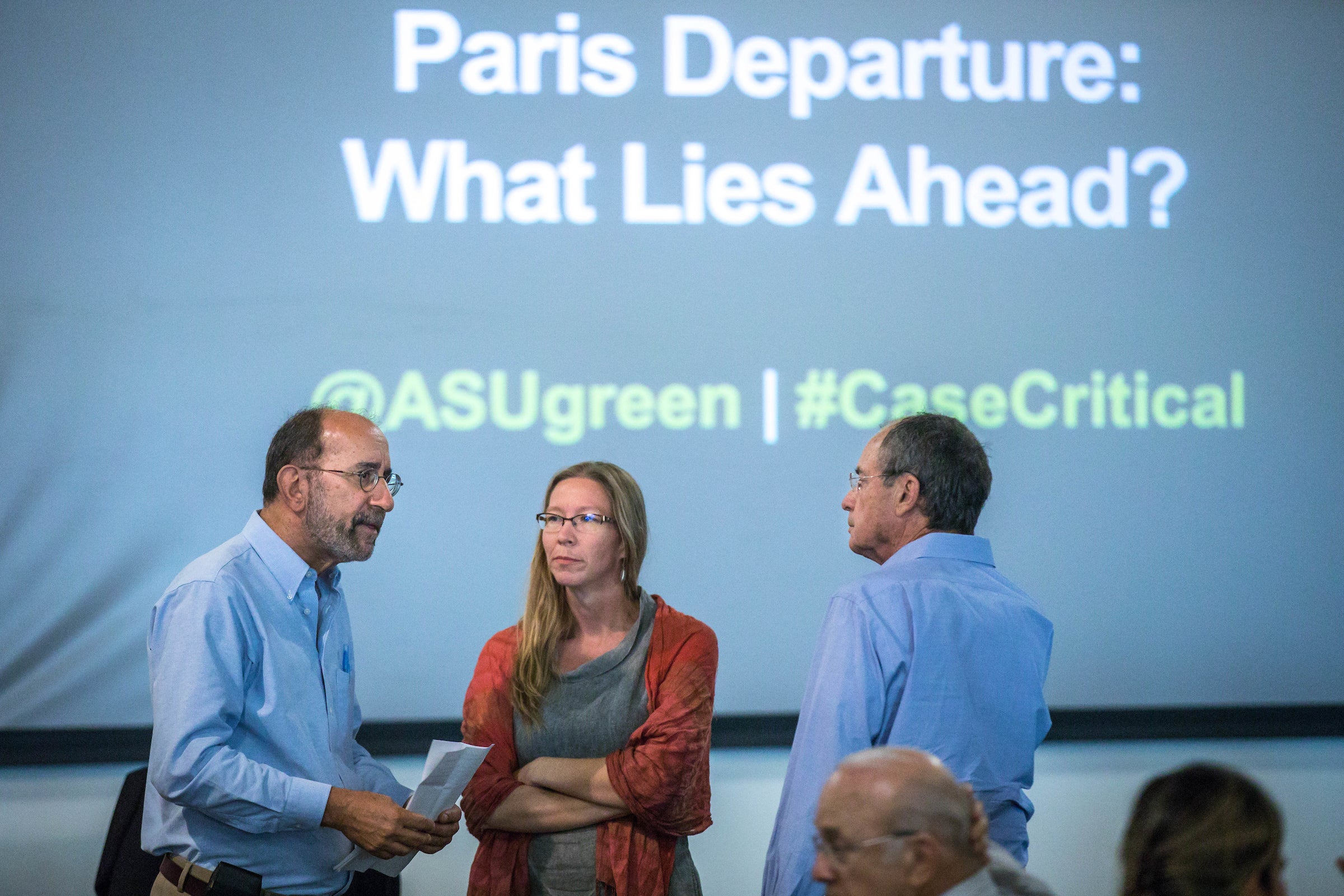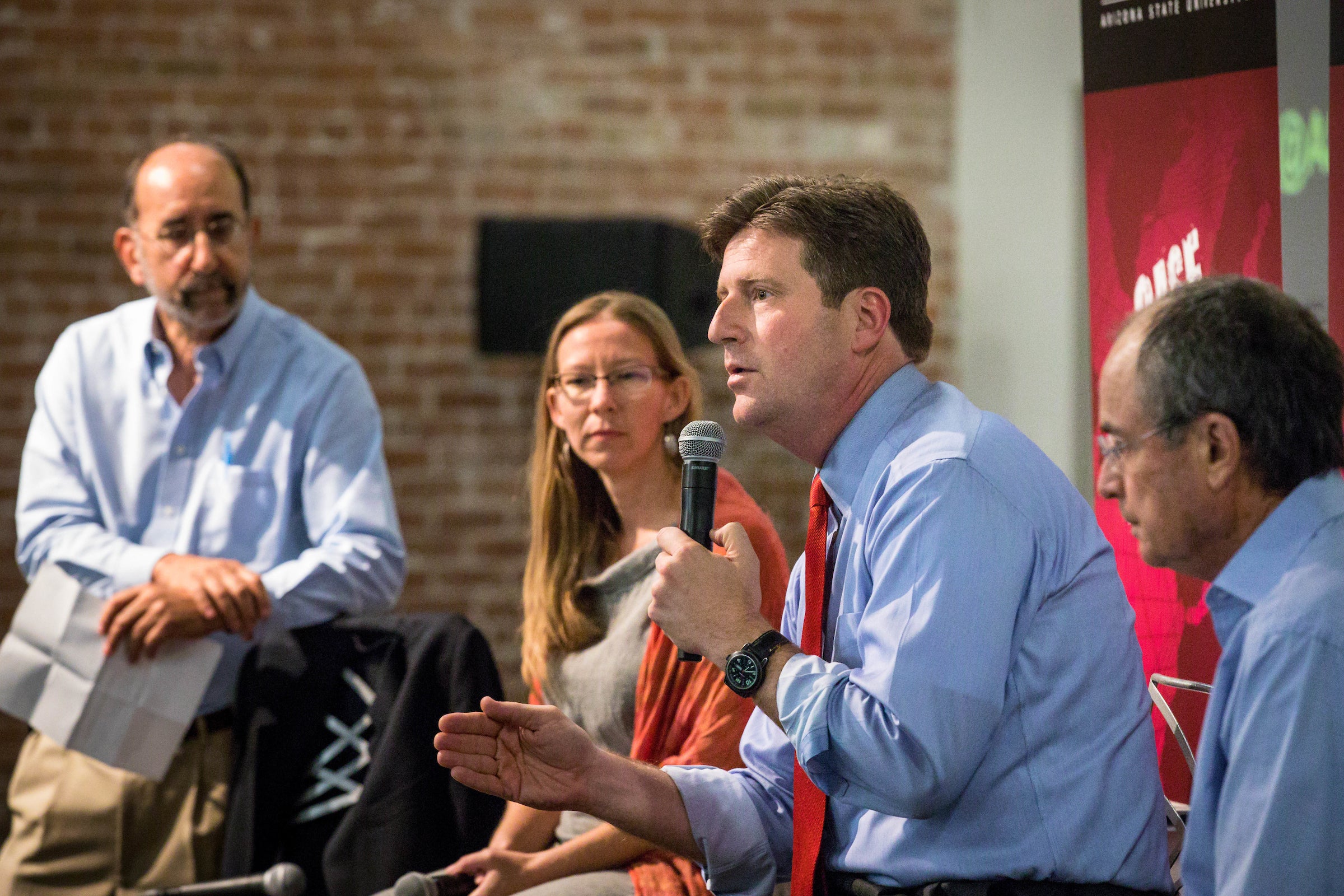When the United States withdrew from the Paris climate agreement earlier this month, it ignited a debate over what should happen next to address the inexorable changes in our environment.
That debate was taken up by the Julie Ann Wrigley Global Institute of Sustainability at Arizona State University with three experts who approached the issue from distinct viewpoints.
The panel discussion, held June 21 at ASU's Downtown Phoenix campus, was moderated by Rob Melnick, executive director of the institute and a professor of practice in ASU’s School of Sustainability.
ASU faculty speak at the "Paris Departure: What Lies Ahead" panel discussion at the Downtown Phoenix campus on Wednesday. From left are Rob Melnick, executive director of the Julie Ann Wrigley Global Institute for Sustainability; Sonja Klinsky, senior sustainability scientist at the institute, and William Boyes, founding director of the Center for the Study of Economic Liberty at ASU. Photo by Charlie Leight/ASU Now
In December 2015, 195 countries signed the agreement, committing to voluntarily reduce carbon emission. Afterward, 147 countries ratified the pact, including the U.S. — although it was sanctioned by then-President Barack Obama, not Congress. On June 1 of this year, President Donald Trump withdrew the U.S. from the pact. Individual cities cannot technically sign the agreement, but in the United States, 330 cities — including Phoenix, Tempe, Flagstaff and Tucson — have committed to the goals of a 26 to 28 percent reduction in carbon emissions by 2025.
“The nations got together not to debate whether there was a changing climate. The question was, what can nations do about it?” said Melnick, who asked each panelist to summarize their starting positions.
Sonja Klinsky, senior sustainability scientist in the Julie Ann Wrigley Global Institute of Sustainability and assistant professor in ASU’s School of Sustainability: “One thing we have to remember is that that we can’t actually leave the globe. We have to work together. It’s not just about climate — when you have an agreement, it affects how you work with a variety of other issues. It was entirely voluntary for every country and it was completely universal, except for Syria and Nicaragua.”
Greg Stanton, mayor of Phoenix: “Even when President Obama signed us up for the Paris accord, mayors knew it would be up to cities to meet the requirements. He may have taken credit for signing on, but we knew it would be local communities around the country that would do the heavy lifting. Our chief sustainability officer has a very ambitious 2050 climate action plan that will make Phoenix carbon neutral in that time.”
William Boyes, founding director of the Center for the Study of Economic Liberty in the W. P. Carey School of Business at ASU: “With this issue, which is so emotionally hot, the seen overrides the unseen. The seen is the seas rising and ice melting, but what we don’t look at is the costs to implement something like the Paris accord. The decline in the number of jobs in the United States would be 600,000 by 2035. Income loss of $20,000 per family of four by 2035. Those are devastating impacts for something that would have a benefit of .03 degrees Celsius at best.”
Highlights from the discussion
Question: Were there economic arguments for countries to sign onto the Paris accord?
Boyes: Many countries signed on because they don’t have to do anything. Other countries signed on because we promised to give them money. CEOs of the top 500 companies loved the Paris accord, but the small companies don’t. Why? Because with the restrictions, competition would be limited.
Klinsky: Does anyone know what per-person emissions are in the U.S. now? It’s around 22 tons per person. In China, it’s about six tons. In India, it’s around two. For most of Africa, it’s less than one. China is starting much lower and will peak at less than half of emissions per person than we will. So far, when China has made promises they’ve kept them in the climate space because they are so vulnerable to climate change.
Phoenix Mayor Greg Stanton makes a point at the climate-change panel discussion held by the Julie Ann Wrigley Global Institute of Sustainability on Wednesday at ASU's Downtown Phoenix campus. Photo by Charlie Leight/ASU Now
Stanton: Phoenix took the lead in investment in light rail in our community. Now we have $9 billion in private-sector investment. If we only look at it as a dollar-for-dollar thing, the cost of not being successful is too great.
Q: While President Trump has taken one position, many cities are making their own commitments. What effect does this have?
Stanton: The city-federal relationship is certainly at its lowest point right now since I’ve been involved in public life. It’s not going to change a thing about how we implement public policy.
Klinsky: For the first time, many city governments were included in many international delegations to participate in negotiations, which is an important element of how we think about how we’ll govern — to recognize the power of local government.
Q: If you support the agreement, what’s bad about it? If you don’t support it, is there anything good about it?
Klinsky: The Paris Agreement cannot say very much about how we deal with vast domestic inequality. There are communities in America where if we took away their main source of revenue, a coal power plant, we have no idea how to deal with them. There is a gaping hole that does not clearly listen to the needs of the lowest-income members of a country.
Stanton: I would say the biggest weakness is that it doesn’t allow mayors to directly sign on. It would have a level of commitment form the participating countries that the rest of the world could better rely on.
Boyes: I worked in very poor countries like Botswana and China 30 years ago, and I have a strong belief in allowing individual freedom and with that freedom, they’ll innovate. One of the problems with this agreement, and so I don’t think there is anything good about it, is that the government dictates what the individual can do.
Q: What about carbon fees?
Klinsky: I think it’s a great idea. There are many ways of putting a price on carbon. By creating some kind of a cost that recognizes that we should not treat our resources as though they have no value — what could be more valuable than our atmosphere? — you are creating a system where companies are incentivized to innovate.
Boyes: It’s an issue that economists have been involved with for a long time. It’s a real possibility. If the government makes something free, everybody overuses it.
Q: How do we move forward on climate change without increasing the partisan divide?
Boyes: I think the example is fracking. That has had the biggest impact on declining emissions in the U.S. than any other event and it’s not government-run or -controlled. It’s actually restricted by the government. If there’s a profit, individuals will jump in and innovate.
Klinsky: I think we’re swimming with opportunities. There are large-scale technological investments. The cost of air pollution to people’s health is astronomical. That’s a public health debate. There’s a social justice perspective. How will we deal with agriculture? Find your skill set and apply it.
Stanton: For some reason this became a partisan issue for a while, but I’m an optimist that this will become a bipartisan way to move forward.
More Law, journalism and politics

ASU launches nonpartisan Institute of Politics to inspire future public service leaders
Former Republican presidential nominee and Arizona native Barry Goldwater once wrote, "We have forgotten that a society progresses only to the extent that it produces leaders that are capable of…

Annual John P. Frank Memorial Lecture enters its 26th year
Dahlia Lithwick, an MSNBC analyst and senior legal correspondent at Slate, is the featured speaker at the School of Social Transformation’s 26th annual John P. Frank Memorial Lecture on…

The politics behind picking a romantic partner
A new study reveals the role that politics play when picking out a romantic partner — particularly for older adults.“Findings show that politics are highly salient in partner selection across gender…


